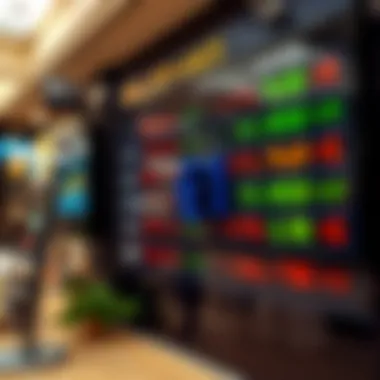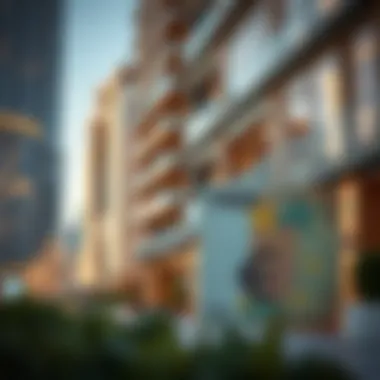Converting 70000 Euro to AED: Insights and Trends


Intro
Navigating the realm of currency conversion, particularly when discussing a significant sum like 70,000 euros, is not merely an academic exercise. It bears implications that resonate deeply with various stakeholders, particularly investors, expatriates, and anyone considering relocating to vibrant destinations such as Dubai. Understanding how euros translate into UAE dirhams is more than just crunching numbers; it involves comprehending the intricacies of the financial landscape, the dynamics of market forces at play, and the broader economic factors that dictate exchange rates.
This article aims to unravel these complexities, offering a foundational understanding that is vital for those engaging with Dubai’s real estate and investment opportunities. The interplay between currency conversion and local market trends cannot be overstated. Not only does this affect purchasing power, but it also has ramifications for property investments, lifestyle decisions, and overall economic engagement within the UAE.
Market Trends and Insights
Current Trends in Dubai Real Estate
The current landscape of the Dubai real estate market is indeed a tapestry rich in both opportunity and challenge. Properties in Dubai have, over the past few years, experienced fluctuations largely influenced by broader economic conditions. As of late 2023, there’s an observable uptick in luxury developments, with properties attracting both local and foreign investors. The appeal of Dubai as a global hub continues to draw attention, especially among European expatriates seeking to leverage favorable exchange rates.
The 70,000 euros currently converting to an approximate amount of 280,000 dirhams provides prospective buyers with a competitive edge. (This figure is subject to market variations, so always check the most recent exchange rate.) The types of properties attracting interest span from high-end apartments in areas like Downtown Dubai to elegant villas on Palm Jumeirah, presenting a plethora of options for potential buyers.
Predictions for Future Market Developments
Looking ahead, analysts project a steady growth trajectory for the Dubai real estate market. Factors such as increased tourism, favorable government policies, and a burgeoning expatriate community contribute to this optimism. Many experts believe that as the world recovers from recent economic uncertainties, Dubai's property market will likely surge further.
- Continued investment in infrastructure and transportation.
- Ongoing efforts to enhance Dubai’s appeal as a global business hub.
- Attractive visa regulations for expatriates, making it easier for foreigners to settle.
Given these developments, anyone converting euros to dirhams must consider the timing of their investments carefully. The current strength of the euro against the AED could provide significant leverage for those wishing to enter the property market.
"Understanding the market dynamics in Dubai is crucial for making informed investment decisions, especially in real estate." - Financial Analyst
Luxury Developments and Properties
Spotlight on Iconic Developments
Among the enticing properties on the market, certain developments stand out for their architectural innovation and luxurious offerings. Projects like One Za'abeel, known for its stunning design and exclusive living quarters, have captured the attention of high-net-worth individuals. Similarly, The Burj Khalifa Residences offer an unparalleled lifestyle for those looking to invest in the essence of Dubai luxury.
These developments not only promise outstanding returns but also appeal to the aesthetic sensibilities of buyers seeking something unique. By investing in these properties, buyers can tap into a lifestyle that blends luxury with cultural richness, making Dubai an attractive proposition.
Investing in Luxury Properties: A Guide
For investors looking to navigate the luxury property landscape in Dubai, it’s essential to approach with a well-informed mindset:
- Research thoroughly: Investigate different neighborhoods and their respective markets to find suitable options.
- Understand financial implications: Factor in not just the conversion rates, but also potential property taxes and fees.
- Connect with local experts: Leveraging the knowledge of real estate agents who have their finger on the pulse of the market can save time and resources.
Preface to Currency Conversion
Currency conversion is a fundamental aspect of global commerce today. It becomes particularly pertinent when dealing with amounts such as 70,000 euros transitioning to United Arab Emirates dirhams. Understanding this subject goes beyond simple arithmetic; it encompasses the nuances of market trends, economic indicators, and personal implications for those involved in investments or relocating to foreign lands.
Understanding Currency Exchange
Currency exchange is not a static concept. It is governed by a myriad of factors that fluctuate constantly. The value of euros against dirhams can change by the minute based on market sentiments, geopolitical stability, and economic performance. Such shifts can either yield profit or loss, depending on whether you are buying or selling currency.
For a would-be expatriate, knowing how to convert their money effectively can mean the difference between a comfortable lifestyle or financial strain in a new country. This makes comprehending the fundamentals of currency exchange critical.
- Here are some key elements to consider:
- Market Influences: Supply and demand largely dictate currency value. High demand for euros versus dirhams can lead to favorable conversion rates.
- Economic Climate: Economic indicators such as inflation rates, employment data, and GDP growth play a significant role in currency valuation.
- Local Regulations: Some countries have specific laws governing currency exchange, which can affect how easily you can convert your funds.
Importance of Accurate Rates
Getting the correct exchange rate is not just a matter of convenience; it’s essential for effective financial planning. Missteps in current rates can lead to overspending or receiving less than you should in conversion.
- Here’s why relying on accurate rates matters:


- Investment Decisions: Investors need precise data to make sound decisions. A small difference in exchange rate can impact yield significantly in the property market.
- Budgeting: Knowing the right conversion can help expatriates manage their finances effectively in their new environment. It affects planning for housing, schooling, and lifestyle adjustments.
- Avoiding Fees: Inaccurate rates might lead to unanticipated fees at banks or money exchange services that often operate on inflated rates.
"Exchange rates are like tides; understanding them can help navigate financial choices smoothly."
Current Exchange Rate Overview
In the realm of currency exchange, understanding the current exchange rate is a crucial step in the journey of converting 70,000 Euros into UAE Dirhams. Exchange rates are not mere numbers; they represent a complex web of market dynamics that affect the overall value of the currency one holds. By grasping this concept, investors, homebuyers, and expatriates can make informed decisions that ripple through their financial strategies.
This section emphasizes the need to be aware of both the market rates and retail rates, illuminating how they differ and why these distinctions matter. As the saying goes, "knowledge is power," and in the context of currency conversion, possessing up-to-date information about exchange rates can mean the difference between walking away with a favorable deal or losing money in a poorly timed exchange.
Market Rates vs. Retail Rates
The market rate refers to the price at which one currency can be exchanged for another in the open market. This rate fluctuates constantly, influenced by supply and demand dynamics, geopolitical events, and overall economic conditions. It's akin to watching the tides: sometimes they surge, other times they recede, but they are always changing.
Conversely, retail rates are what you encounter when you approach a bank or a currency exchange service. These rates usually differ from market rates due to the markup typically applied by service providers to cover their costs and make a profit. Here’s what you should be aware of:
- Differences Matter: The gap between market rates and retail rates might be small on some days and significantly larger on others, so timing your conversion process is key.
- Extra Charges: Be on the lookout for transaction fees or hidden charges that can further affect your final amount when converting currency.
- Examples:
- On a particular day, if the market rate for Euro to AED is 4.1, you might find at a retail exchange service, the rate is 4.05.
- Small variations may add up when you’re converting a large sum like 70,000 Euros.
Understanding this difference and keeping tabs on both rates will enable you to strategize better around currency conversion.
Sources for Current Rates
Finding reliable sources for current exchange rates is another cornerstone for anyone looking to convert currency effectively. In this modern age, where information is at our fingertips, the following channels can provide trustworthy data:
- Financial News Websites: Trusted platforms such as Bloomberg, Reuters, or CNBC regularly update exchange rates and offer insights on currency movements.
- Bank Websites: Most banks provide up-to-date exchange rates on their official sites, though keep in mind, their retail rates may vary.
- Exchange Rate APIs: For developers or tech-savvy individuals, APIs from sources like Open Exchange Rates or CurrencyLayer can deliver real-time data.
- Mobile Apps: Currency converter apps are handy and can give relatively accurate rates, ensuring you're not taken for a ride during exchanges. Most people use XE or OANDA for reliable information.
"The best way to predict the future is to create it." This adage holds true in currency conversion; you can take control by staying informed.
By tapping into these resources, one can consistently check for the most favorable rates and be competitive while managing finance in the UAE. Understanding where to look for this information equips individuals with the knowledge necessary to navigate the often choppy waters of currency conversion with confidence.
Calculating the Conversion
Calculating the conversion from euros to UAE dirhams is not just a matter of numbers; it is a fundamental process that can significantly impact any financial decision made by investors, expatriates, or homebuyers interested in the UAE market. The details surrounding this topic go beyond simple arithmetic. Understanding the various nuances of the conversion provides insights into the larger financial landscape that characterizes international transactions. Factors such as fluctuating exchange rates, market trends, and the potential for profit or loss can weigh heavily on decision-making. In a region like Dubai, where economic activity is brisk, grasping these concepts becomes crucial.
The ability to accurately convert currencies can help you predict potential acquisition costs, assess investment returns, and navigate lifestyle expenditures. Say you have 70,000 euros; knowing how that translates into dirhams can inform choices about real estate investments or daily living expenses, which are typically affected by exchange dynamics. Hence, understanding the ins and outs of calculating this conversion becomes vital for anyone looking to thrive financially in the UAE.
Steps for Conversion
To convert euros to dirhams effectively, follow a structured approach:
- Check the Current Exchange Rate: The first step hinges on finding the most recent exchange rate for euros to AED. Rates fluctuate throughout the day and accessing up-to-date information is key. Websites such as XE or financial news outlets can provide real-time data.
- Use Correct Calculation Tools: With the exchange rate in hand, employ a currency converter tool or calculator. Many banks and financial institutions offer these tools on their websites.
- Do the Math: Multiply the amount you have in euros by the exchange rate. For instance, if the current rate is 4.2, multiply 70,000 euros by 4.2. Your formula will look like this:
- Consider Additional Costs: It's crucial to remember that banks or exchange services might charge fees, affecting the final amount you receive. Always account for these additional financial obligations to achieve an accurate assessment of what you will ultimately have in dirhams.
- Document Everything: Always keep a record of the rate, the amount converted, and any associated fees. This documentation is particularly useful for accounting purposes and tracking expenses over time.
Following these steps will ensure a seamless conversion process, allowing investors or expatriates to plan better and mitigate financial risks.
Expected Outcomes
When converting 70,000 euros to AED, there are several expected outcomes one should consider:
- Total in Dirhams: Initially, one might anticipate receiving a certain amount based on the exchange rate. Using our previous example, one would expect to see approximately 294,000 AED, not accounting for fees.
- Buying Power Assessment: Understanding how much value that amount holds in local currency is critical, especially in a city like Dubai, known for its varied cost of living.
- Market Trends Insight: The conversion process also offers insight into current market trends. A stronger euro against the dirham may indicate economic health in the Eurozone, while a weaker euro could signal opposing trends, affecting investment decisions.
- Impact of Fees: As mentioned earlier, fees from exchanges can significantly diminish the expected outcomes. Comparing various platforms for competitive rates and minimal charges can ensure one retains a larger portion of the converted amount.
- Long-term Planning: Regularly engaging in conversions helps develop a clearer picture of long-term financial goals. By understanding how currency fluctuations can affect investments or living standards, one can plan more effectively.
In summary, calculating the conversion of euros to dirhams is essential for anyone venturing into the financial landscape of the UAE. Armed with the correct tools and knowledge, you can maximize your resources while mitigating any potential downturns in currency—it's just plain smart investing.
Factors Influencing Exchange Rates
Understanding the dynamic nature of exchange rates is key for any investor, expat, or traveler looking to convert Euros to UAE Dirhams. Exchange rates can fluctuate widely based on a myriad of factors, impacting not just the amount received during currency conversion but also wider financial decisions. Therefore, comprehending these factors is paramount for those engaging in financial transactions between Europe and the UAE.
Economic Indicators


Economic indicators serve as the backbone for assessing the health of a country's economy, thus influencing its currency value. Key indicators include:
- Gross Domestic Product (GDP): A high GDP suggests a flourishing economy, which in turn can lead to a stronger currency.
- Inflation Rates: Countries with lower inflation typically have stronger currencies. If inflation is high in Europe, it could lead to a depreciation of the Euro against the Dirham.
- Employment Figures: High employment often indicates robust economic growth, boosting a currency's value. Conversely, poor job numbers can weaken the Euro.
Often, when you look at these metrics, you will notice that even a slight change can sway investor confidence, leading to immediate reactions in currency markets. For instance, if the European Central Bank announces efforts to stimulate growth, it may affect the Euro's value, prompting shifts in conversion rates with the Dirham. This relationship underscores the necessity for regular monitoring of these indicators to maximize feasible returns for investors.
Political Stability and Its Impact
Political conditions exert a powerful influence on currency values. Stable political environments are typically associated with stronger currencies. For example, if a country is embroiled in uncertainty or conflict, it may deter foreign investment and lead to currency depreciation. Here are a few considerations:
- Government Stability: Leadership changes or political turmoil can quickly erode trust and value.
- International Relations: Countries that maintain good relations with others often see stronger currencies. If the EU strikes beneficial trade agreements, it could enhance the Euro's robustness.
- Policy Decisions: Economic policies can also sway markets; for instance, a plan to tighten monetary policy might embolden the Euro while increasing investor confidence.
In essence, the political landscape serves as a barometer for investors. A sound political environment in Europe might encourage conversion and investment in Dirhams, enriching overall financial strategies. Ultimately, staying attuned to both economic indicators and political shifts equips stakeholders with insights necessary to navigate the intricacies of currency exchange intelligently.
Implications for Investors
When it comes to converting euros to UAE dirhams, the implications for investors are monumental. With 70000 euros on the line, the conversion process isn’t just a simple transaction; it opens bridges to a wealth of opportunities and pitfalls that every astute investor should be aware of.
Understanding the factors influencing this conversion is essential for making informed financial decisions. Investors must consider market conditions, regulatory environments, and economic forecasts before delving into property or other investment avenues in the UAE. The UAE’s real estate market has drawn significant interest from foreign investors, especially given its burgeoning economy and strategic location as a global hub. However, merely exchanging euros into dirhams without thorough analysis can be like stumbling into a minefield.
Real Estate Opportunities in Dubai
Dubai's property market is a tapestry woven with opportunities and risks alike. The emirate is known for its lavish developments, ranging from luxury apartments to vibrant commercial spaces. Here are some salient aspects regarding real estate that investors may find valuable:
- Diverse Investment Options: From residential flats in neighborhoods like Jumeirah Beach Residence to commercial properties in the Dubai International Financial Centre, there’s something for everyone. Investors can explore various properties that match their budgets and preferences.
- High Rental Yields: Investors are often attracted by the high rental yields in Dubai compared to many other global cities. With expatriates making up a large portion of Dubai's population, rental demand remains robust.
- Regulatory Framework: The UAE government has instituted a variety of laws and incentives to attract foreign investors. It’s essential to be acquainted with regulations relating to ownership, such as freehold versus leasehold agreements, so as not to inadvertently paint oneself into a corner.
- Market Trends: Staying abreast of market trends is crucial. Areas that are in the spotlight today might be overshadowed tomorrow, so regular monitoring and analysis are necessary to navigate these waters successfully.
With these opportunities come certain considerations such as market fluctuations and potential for oversupply that could impact returns. While real estate can yield substantial profits, calculated risks are part and parcel of the journey.
Understanding Fees and Taxes
Diving into real estate investment without understanding the associated costs can be akin to diving into deep waters without knowing how to swim. The financial landscape in Dubai does involve fees and taxes that could chew away at your investment returns. Being well-informed alleviates the risk of unwelcome surprises.
- Registration Fees: Generally, buyers are required to pay a property registration fee, which is often 4% of the property's value. This fee isn't just a drop in the bucket, especially with high-value properties.
- Maintenance Fees: Owning property in Dubai also comes with ongoing maintenance fees, especially in managed communities. It's prudent to account for these as they can accumulate over time.
- Income Tax: Thankfully for investors, the UAE does not impose income tax on rental properties. However, one should remain aware of potential changes in regulations, as they can alter the landscape significantly.
- Capital Gains Tax: Currently, there is no capital gains tax in the UAE, allowing investors to cash in without additional burdens. Nonetheless, it’s crucial to keep an eye on future governmental policies that may impact this positive aspect.
Understanding these fees and taxes will help investors to budget accurately and avoid overstepping their financial bounds. In the end, knowledge is power—especially in the fast-paced financial environment of the UAE.
Remember: Every euro that turns into dirhams can be a stepping stone to broader horizons, but it requires diligent preparation and understanding to truly capitalize on the potential.
Currency Fluctuations and Risks
In the realm of financial transactions, particularly when converting currencies like 70,000 Euros into AED, understanding currency fluctuations and the associated risks is paramount. These fluctuations can significantly affect how much you end up receiving in the local currency after making an exchange. Factors such as political stability, economic performance, and global market trends play a pivotal role in determining these fluctuations.
To navigate this unpredictable landscape, one must pay close attention to not only the rates themselves but also the broader context in which these changes occur. Investors and expatriates alike need to be well-informed about the trends that could lead to shifts in currency values. Without this knowledge, the chance of encountering unexpected financial fallout rises dramatically.
"Failure to grasp the dynamics of currency fluctuations can turn a simple transaction into a costly error."
Having an understanding of how and why currencies move can provide you with a framework to mitigate risks effectively. It’s also wise to be aware of the specific implications for your financial goals. This becomes even more crucial when managing investments or savings in foreign currencies, as the stakes are considerably higher.
Mitigating Risks in Currency Exchange
To minimize potential losses due to currency fluctuations, consider employing various strategies that can act as a buffer.
- Utilize Hedging Options: Engaging in hedging can provide coverage against adverse currency movements. Instruments such as forward contracts or options can lock in rates to safeguard your investment against volatility.
- Stay Updated on Economic Indicators: Follow key economic indicators like inflation rates, employment statistics, and interest rates, which can signal upcoming changes in currency values. A keen awareness can allow for timely conversions.
- Diversify Investments: It’s prudent not to put all your eggs in one basket when it comes to currency. Diversifying your holdings can reduce exposure to a single currency’s fluctuations.
- Consider Timing: The foreign exchange market operates continuously, and rates can change frequently. Monitoring these movements can help you convert when rates are favorable.
Ultimately, being proactive rather than reactive can take the sting out of currency exchange risks.
Investment Strategies in Volatile Markets
In volatile markets, having a solid investment strategy is essential for both safeguarding assets and capitalizing on new opportunities.


- Research Current Trends: Knowledge is power. Deeply researching market trends can uncover signals of potential shifts that might benefit you in the long run.
- Set Clear Goals: Whether you’re looking to maximize returns or minimize losses, defining clear investment goals can steer your strategy in the right direction.
- Evaluate Risk Tolerance: Understanding your own risk tolerance is crucial. Some investors may thrive on high-risk, high-reward strategies, while others will prefer a more conservative approach.
- Use Technology Wisely: Take advantage of technology by utilizing financial apps and platforms that provide real-time data on currency fluctuations. This can enable quick decision-making when opportunities arise.
- Seek Professional Advice: Consulting with financial experts can provide tailored strategies that align with your situation, especially in complex markets.
By implementing these methods, investors can navigate through the choppy waters of currency exchange, turning potential pitfalls into stepping stones for success.
Using Currency Exchange Services
In the realm of international finance, utilizing currency exchange services plays a pivotal role. This is particularly true when converting significant sums, such as 70,000 Euros to AED. Understanding how to effectively use these services can lead to meaningful savings and a smoother transaction experience. The notion of currency exchange is not merely about numbers; it encompasses reliability, efficiency, and cost-effectiveness.
Selecting Reliable Services
When it comes to selecting a reliable currency exchange service, the task can feel monumental, yet it’s absolutely essential. One of the primary factors to consider is the reputation of the service provider. You might want to look up user reviews or ratings across platforms like Reddit or trustpilot. Checking for accreditations and licenses also helps in ensuring the company operates within legal frameworks.
In addition, scrutinizing the fees charged is vital. Some providers may offer seemingly great rates but quickly offset them with hidden fees. It’s always a good strategy to read the fine print. Moreover, evaluating the customer service aspect can tip the scales in favor of one service over another. A helpful support team can be invaluable, especially when you’re dealing with a large amount of money.
"A stitch in time saves nine," as the saying goes. Taking the time to properly assess your service options can save you considerable hassle further down the line.
Comparing Currency Exchange Platforms
In today’s digital age, the plethora of options available for currency exchange can be overwhelming. When comparing various platforms, several aspects should be kept in mind:
- Exchange Rates: These can fluctuate regularly. Being vigilant can yield better results. Check platforms like XE.com or OANDA for live exchange rates to stay updated.
- Transaction Speed: Depending on your urgency, the speed at which a platform processes transactions could be a deciding factor. Some services might offer instant exchanges, while others may take a few days.
- Accessibility: Nowadays, most currency exchange services provide online facilities, making it easier to conduct transactions from anywhere. Ensure that the platform is user-friendly and offers robust security features.
- Support for Multiple Currencies: If you foresee the need to deal with other currencies in the future, consider platforms that accommodate a wider range of currencies, beyond just AED and Euro.
By taking a comparative approach, potential investors and expatriates can make informed decisions that align with their financial goals. Whether it’s the need for immediate liquidity in Dubai’s bustling market or a planned investment strategy, the choice of exchange service can significantly impact one’s financial journey.
Lifestyle Considerations in Dubai
Understanding the lifestyle in Dubai is crucial, particularly for those who are planning to convert their currency and invest in the UAE. The glimmering skyscrapers and luxurious shopping districts often overshadow more practical aspects of living in this vibrant city. When considering a conversion of 70,000 euros to AED, it’s not just about the numbers; it’s also about how those funds can fit into one’s lifestyle and long-term plans in Dubai.
Adjusting to Cost of Living
The cost of living in Dubai can vary significantly based on one’s lifestyle choices. While some may find it aligned with their expectations given the city’s global status, others might be taken aback by expenses. Housing, education, transportation, and groceries are key areas that contribute to overall expenses. For instance, rental prices in desirable neighborhoods such as Dubai Marina or Downtown can be steep, often requiring a significant portion of one’s income.
- Housing: Renting a one-bedroom apartment in the city center can range from 80,000 AED to over 120,000 AED annually. Hence, having a thorough understanding of your budget is imperative.
- Transportation: Public transport is relatively affordable; a monthly pass for the metro costs around 300 AED. Alternatively, many choose to drive, which adds further expenses including fuel and vehicle maintenance.
- Groceries: A typical grocery bill for a single individual might average around 1,000 to 1,500 AED monthly, depending on dietary habits.
Adjusting your finances to accommodate these costs, particularly after converting euros to AED, is vital for a smooth transition. It’s wise to conduct thorough research and possibly connect with other expatriates to gain insight on budget tips and tricks.
Cultural Aspects of Financial Transactions
In Dubai, navigating financial transactions also means understanding the cultural dynamics at play. The Emirati culture heavily values relationships and personal connections. This is particularly relevant when dealing with banks or financial services.
- Negotiation: Unlike many Western countries, where prices may be fixed or set, in Dubai, there is often room for negotiation. This applies to various transactions ranging from property rentals to various services.
- Networking: Building relationships can sometimes mean getting better deals or accessing exclusive financial products. Joining local clubs or forums can enhance your experience, offering chances to meet locals and other expats. A platform like Reddit can be a good resource in connecting with others who share your interests.
- Documentation: Familiarizing yourself with the UAE’s legal and banking requirements is crucial. Expats often need to provide specific documentation such as residency permits to engage in financial transactions or open accounts.
In summary, comprehending the lifestyle in Dubai entails more than just knowing how much your euros turn into dirhams. It involves practical knowledge about the cost of living, cultural norms around financial exchanges, and the importance of building a community. As the city continues to evolve, so too should one’s understanding of how lifestyle and finance interplay in their day-to-day activities.
“Knowledge of the local culture is as valuable as the currency itself.”
To further enrich your experience and make informed decisions regarding currency conversion, familiarize yourself with resources like the UAE government website for latest updates on taxation and property investment.
Culmination and Final Thoughts
As we draw this discussion to a close, it becomes clear that converting 70,000 Euros to UAE Dirhams is not merely a matter of exchanging money; it's about understanding a complex web of financial intricacies and market dynamics. The elements discussed throughout the article highlight the necessity for both investors and expatriates to stay informed and proactive.
Summary of Key Points
- Accurate Exchange Rates: Recognizing the difference between market and retail rates can save you a significant amount of money.
- Impact of Economic Indicators: Such factors as inflation and unemployment can sway your returns on investment.
- Lifestyle Factors: Engaging with Dubai's unique cost of living can help shape realistic expectations when planning relocations.
- Currency Fluctuations: Being aware of risks can guide you in making sound investments.
Understanding these elements equips individuals to make informed decisions in a fast-paced financial environment. It emphasizes the importance of regular checking of exchange rates and understanding the timing of currency conversions. For professionals looking to invest in the UAE, a comprehensive understanding deepens the potential for success.
Future Trends in Currency Exchange
Currency exchange is constantly morphing as technology and global events reshape the financial landscape. Here are some trends to note:
- Digital Currency Growth: Cryptocurrencies are gaining traction, possibly affecting traditional currency exchange rates.
- Real-Time Exchange Platforms: Services offering instant rates in real-time could change how we interact with currency exchange.
- AI and Predictive Analytics: Utilizing artificial intelligence to predict currency movements may transform investment strategies.
- Sustainable Currency Practices: Environmental concerns are influencing how currency transactions are processed, with many companies opting for greener methods.
Adapting to these future trends will be essential for anyone looking to engage in currency exchanges responsibly and profitably. In the end, a well-informed approach to converting Euros to Dirhams can streamline your dealings and enhance your potential returns in the vibrant market of the UAE.















